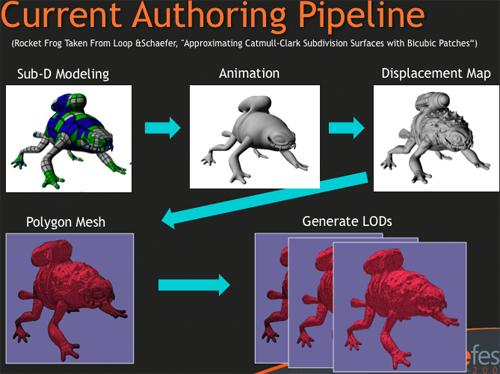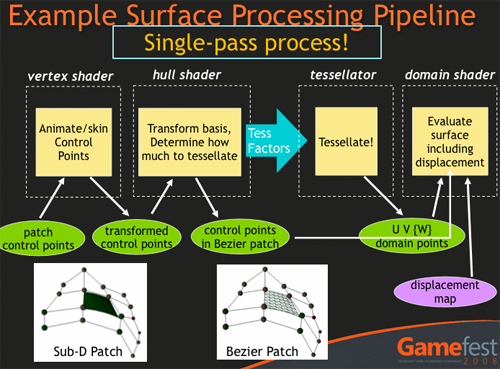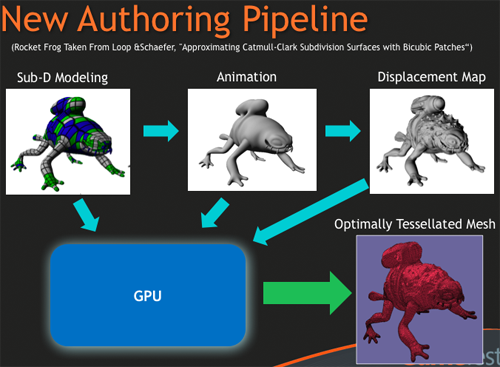Tessellation: Because The GS Isn't Fast Enough
Microsoft and AMD tend to get the most excited about tessellation whenever the topic of DX11 comes up. AMD jumped on the tessellation bandwagon long ago, and perhaps it does make sense for consoles like the XBox 360. Adding fixed function hardware to quickly and efficiently handle a task that improves memory footprint has major advantages in the living room. We still aren't sold on the need for a tessellator on the desktop, but who's to argue with progress?
Or is it really progressive? The tessellator itself is fixed function rather than programmable. Sure, the input to and output of the tessellator can be manipulated a bit through the Hull Shader and Domain Shader, but the heart of the beast is just not that flexible. The Geometry Shader is the programmable block in the pipeline that is capable of tessellation as well as much more, but it just doesn't have the power to do tessellation on any useful scale. So while most everything has been moving towards programmability in the rendering pipe, we have sort of a step backward here. But why?
The argument between fixed function and programmable hardware is always one of performance versus flexibility and usefulness. In the beginning, fixed function was necessary to get the desired performance. As time went on, it became clear that adding in more fixed function hardware to graphics chips just wasn't feasible. The transistors put into specialized hardware just go unused if developers don't program to take advantage of it. This made a shift toward architectures where expanding the pool of compute resources that could be shared and used for many different tasks became a much more attractive way to go. In the general case anyway. But that doesn't mean that fixed function hardware doesn't have it's place.
We do still have the problem that all the transistors put into the tessellator are worthless unless developers take advantage of the hardware. But the reason it makes sense is that the ROI (return on investment: what you get for what you put in) on those transistors is huge if developers do take advantage of the hardware: it's much easier to get huge tessellation performance out of a fixed function tessellator than to put the necessary resources into the Geometry Shader to allow it to be capable of the same tessellation performance programmatically. This doesn't mean we'll start to see a renaissance of fixed function blocks in our graphics hardware; just that significantly advanced features going forward may still require the sacrifice of programability in favor of early adoption of a feature. The majority of tasks will continue to be enabled in a flexible programmable way, and in the future we may see more flexibility introduced into the tessellator until it becomes fully programmable as well (or ends up just being merged into some future version of the Geometry Shader).

Now don't let this technical assessment of fixed function tessellation make you think we aren't interested in reaping the benefits of the tessellator. Currently, artists need to create different versions of their objects for different LODs (Level of Detail -- reducing or increasing complexity as the object moves further or nearer the viewer), and geometry simulation through texturing at each LOD needs to be done by pixel shaders. This requires extra work from both artists and programmers and costs a good bit in terms of performance. There are also some effects than can only be done with more geometry.

Tessellation is a great way to get that geometry in there for more detail, shadowing, and smooth edges. High geometry also allows really cool displacement mapping effects. Currently, much geometry is simulated through textures and techniques like bump mapping or parallax occlusion mapping or some other technique. Even with high geometry, we will want to have large normal maps for our lighting algorithms to use, but we won't need to do so much work to make things like cracks, bumps, ridges, and small detail geometry appear to be there when it isn't because we can just tessellate and displace in a single pass through the pipeline. This is fast, efficient, and can produce very detailed effects while freeing up pixel shader resources for other uses. With tessellation, artists can create one sub division surface that can have a dynamic LOD free of charge; a simple hull shader and a displacement map applied in the domain shader will save a lot of work, increase quality, and improve performance quite a bit.

If developers adopt tessellation, we could see cool things, and with the move to DX11 class hardware both NVIDIA and AMD will be making parts with tessellation capability. But we may not see developers just start using tessellation (or the compute shader for that matter) right away. Because DirectX 11 will run on down level hardware and at the release of DX11 we will already have a huge number cards on the market capable of running a subset of DX11 bringing with it a better, more refined, programming language in the new version of HLSL and seamless parallelization optimizations, we will very likely see the first DX11 games only implementing features that can run completely on DX10 hardware.
Of course, at that point developers can be fully confident of exploiting all the aspects of DX10 hardware, which they still aren't completely taking advantage of. Many people still want and need a DX9 path because of Vista's failure, which means DX10 code tends to be more or less an enhanced DX9 path rather than something fundamentally different. So when DirectX 11 finally debuts, we will start to see what developers could really do with DX10.
Certainly there will be developers experimenting with tessellation, but these will probably just be simple amplification to get rid of those jagged edges around curved surfaces at first. It will take time for the real advanced tessellation techniques everyone is excited about to come to fruition.










109 Comments
View All Comments
Havor - Saturday, January 31, 2009 - link
DX10 is Vista only ware XP and 98SE/win2k shared a common DXAnd yeah XP was Win2K but it had better gaming support then W2K so there was no reason not to use XP over W2K, and only very old games gave some problems whit XP over 98SE.
Ware Vista almost had no RL benefits over XP just a high resource hog and steep learning curve.
If people could had a those between XP and vista i think Vista Nr's would have bin 75% lower
Other then DX10 and x64 there is no reason for me to go to Vista, so i will wait for Win7 and upgrade to i7/i5 till then my X2 6000+ and XP sp3 will do
michal1980 - Friday, January 30, 2009 - link
i agree with most of your logic. And it makes sense. It didn't feel right with the rest of the article though.I will however disagree with it being compared to Win ME.
Win ME was just junk, unstable, worthless, and never improving. And while vista had teething issues, alot of it was due to a huge shift in the actual OS.
I haven't tired 7 yet, but from all I read,it seems like vista re-tuned. However I doubt Win7 could have ever gotten to where it is without Vista. Vista was a trail by fire, and in most cases it made it. A huge problem early on was hardware specs to run it were set too low, and it was hell for people on cheap low end hardware.
My experance has been overall very postive, esspically when I moved to 4gb's of ram. Driver problems now are minimal (x64), and no matter how stable XP ever was. IMHO, and in my experance, vista has been leaps and bounds more stable. I can't recall having an OS crash/lock up that required a reboot. If not for hardware changes/updates, my vista box would never reboot.
Havor - Saturday, January 31, 2009 - link
The compering to ME holds up some bid, do vista is not as bad as ME was.How ever on my computer club there was a 100% return to 98SE ore win2k, most users(70%) here that run dual-boot Vista/XP machine, returned to XP after trying Vista for a wile (me included)
And there has never bin Any love for the OS especially compared to XP.
The bigger problem for dev. is that DX10 is Vista only, and there are way to many XP machines out there to develop DX10 only games, so from a dev. point of view Vista was/still is the next ME.
just4U - Wednesday, February 4, 2009 - link
WinME is what Vista will eventually be compared to no matter what. I had less problems with WinME then I did with 98, or 95 but it got a bad rap.. Nowadays people just all say it was crap. Im sure 5-7+ years from now they will say the exact same thing about Vista. (shrug)marsbound2024 - Friday, January 30, 2009 - link
I agree with what you have said. Microsoft had years to develop Vista where previously its OS releases came within two years of each other. It should have been optimized at the very least and we have seen that it is resource-intensive and one might even say "bloated." While Vista does work and I rather like working with Vista 64-bit, I think it should have been more than what it is for having such a lengthy development timeframe. While many of us superbly informed on computer operating systems and application support, the average consumer seems to really dislike Vista. From UAC to horrible startup times on occasion (usually due to services such as Cyberlink), to the network connectivity problems that seem to be related to IPv6 and the fact that it used to bring budget systems to their knees (when they were manufactured with the purpose of running Vista), most people have a bad taste in their mouths from running Vista. Vista had a lot of promise on the table from what was on paper, but in execution it simply generated more headaches than it should have. Windows 7 should hopefully be getting back to what an operating system should be: streamlined GUI with robust, yet optimally programmed features that range from security to file management on NTFS.srp49ers - Friday, January 30, 2009 - link
The vista comments seemed out of place considering the tone of the rest of the article.Cuhulainn - Friday, January 30, 2009 - link
Agreed. Even if you think it sucks, give the reasons related to the article. I would like to know what issues there are between Vista/DirectX, as I am a current user. Rather than being told that what I am running sucks, tell me what is wrong with it, or what is right with 7 that is an improvement over Vista.That being said, I have little to no knowledge of these things and still found this to be an interesting read. Much appreciated.
Staples - Saturday, January 31, 2009 - link
And the fact that a year ago, most people who said that Vista sucks are ones who unsurprisingly never actually used it. When someone says Vista sucks, I always think there is a high probablility that they are someone who has never used it (and therefore stupid for saying something like that). Anyway, I have been using Vista since it came out and except for the fixes which made it use less resources, there never has been anything wrong with the OS despite what the legion of "I read it on the internet so it must be true" people would have you believe. Seems like the majority of geeks thought it sucked without having ever used it which is just idiotic. When I realized this, it was sad to know how gulible people really are.ssj4Gogeta - Friday, January 30, 2009 - link
It will be great if MS releases DX11 for XP. I multi-boot XP and Vista and Ubuntu. I think I'll replace Vista with Win 7 and not XP.By the way, why haven't we heard anything about Larrabee? Intel said that the first samples would be ready by the end of 2008. It seems to me like it will be a revolutionary step in graphics computing.
Ryan Smith - Friday, January 30, 2009 - link
It won't happen, it can't happen. DX10 goes hand-in-hand with a massive rearchitecting of GPU threading and memory management, which is why we transitioned from the XPDM to WDDM for Vista. You can't backport that kind of stuff, it's a fundamental change in how the OS addresses the GPU and allocates work & resources for it.